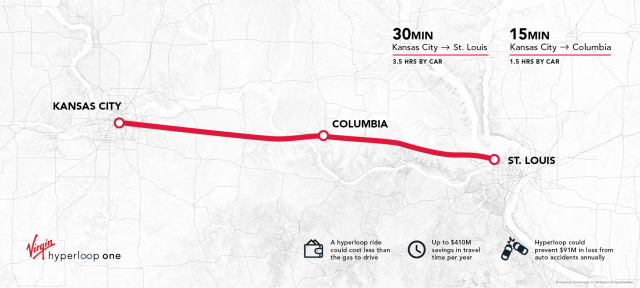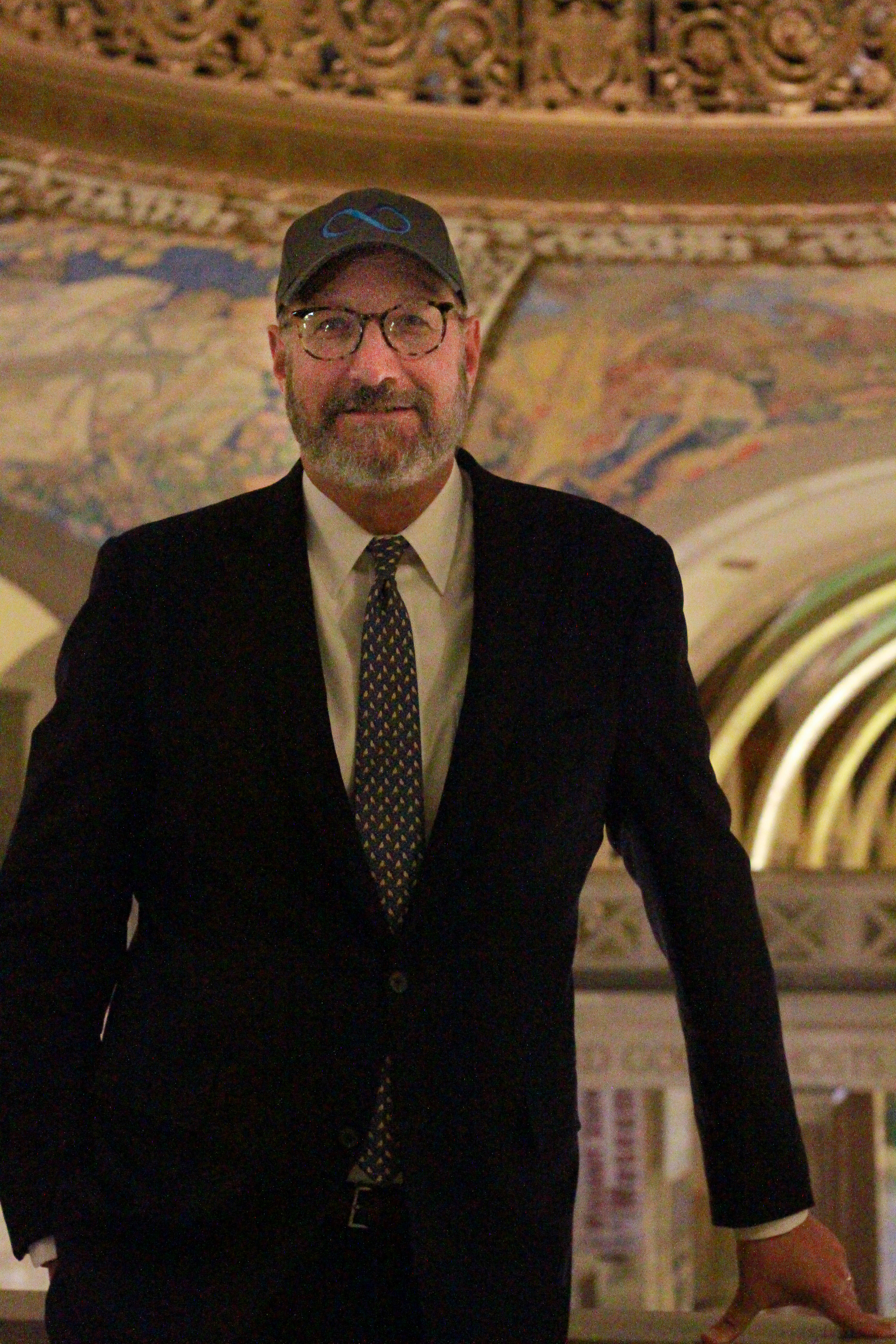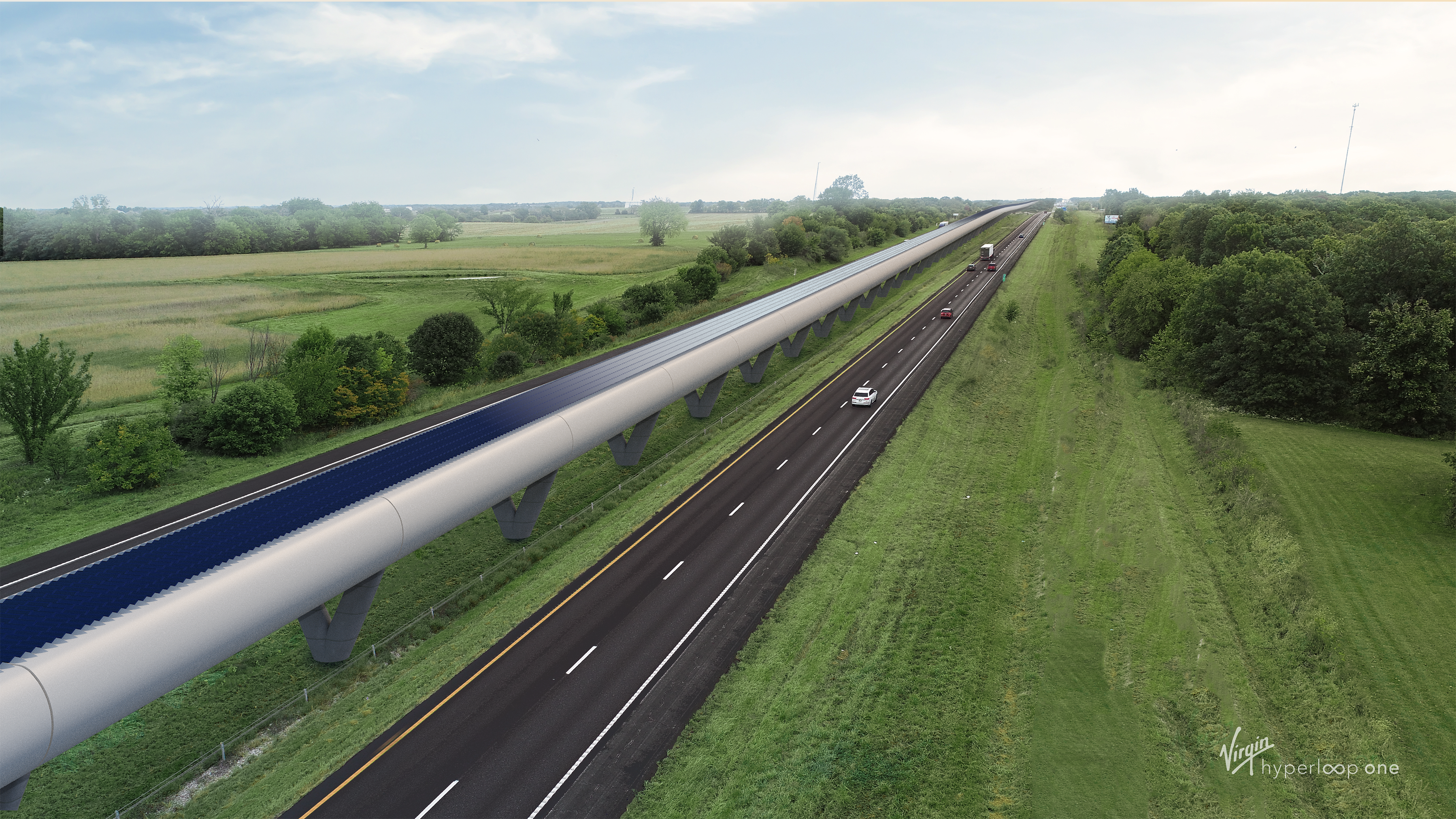JEFFERSON CITY, Mo. — The CEO of the company poised to implement a new mode of travel in the U.S. got an on-the-ground look at one proposed route this week.
Jay Walder, CEO of Virgin Hyperloop One, a technology company based in Los Angeles, California, visited a multitude of Missouri cities — including Kansas City, Columbia, St. Louis, Jefferson City, and Springfield — in the span of three days.
 Virgin Hyperloop One is reviewing 10 proposed routes for the first hyperloop track. One of the routes would connect Kansas City and St. Louis with a traveling time of roughly 30 minutes.
Virgin Hyperloop One is reviewing 10 proposed routes for the first hyperloop track. One of the routes would connect Kansas City and St. Louis with a traveling time of roughly 30 minutes.
Walder got a firsthand look at the “enthusiasm” backing the Missouri route as he met with business leaders, university employees, academics, and government officials, including Gov. Mike Parson.
Black & Veatch conducted the first-ever feasibility study on a hyperloop track. The report confirmed the viability of the I-70 based route through an exhaustive examination of the social impact, station locations, regulatory issues, route alignments, and rights-of-way associated with a new hyperloop system that would connect Kansas City, Columbia, and St. Louis.
Though, as Diana Zhou, director of Project Strategy at Virgin Hyperloop One, told The Missouri Times, a Missouri hyperloop is not a done deal.
In March, Speaker of the House Elijah Haahr formed a special Blue Ribbon Panel on Hyperloop, which Walder referred to as a “model coalition.”
It’s a perfect day to welcome the CEO of @HyperloopOne to @CityofSgf. Incredible discussion about Missouri’s role in being a national leader in technology & transportation innovation. pic.twitter.com/HRfv4kZp00
— Elijah Haahr (@elijahhaahr) April 26, 2019
There are still numerous steps to be taken before anything is set in stone.
One of those steps, according to Walder, would include building a test facility to “demonstrate how hyperloop works” and to determine “the regulatory and safety approach.”
While Walder was visiting Missouri’s Capitol, we took the opportunity to sit down with him. Below is a conversation between the Missouri Times (MT) and Walder (JW), with Walder’s responses edited for clarity.

MT: How did you become CEO of Hyperloop?
JW: My background is in running large scale public transit systems. I was the chairman and CEO of the MTA in New York, the largest public transit system in the United States. I helped run the London transport system, and I have run the Hong Kong transit system.
When people from Virgin Hyperloop reached out to me, it was just an incredibly exciting opportunity. I was skeptical like everybody else — I’m from New York, so it is kind of in my DNA to be skeptical. But I visited the test facility in Nevada, where you can really see hyperloop functioning and working, and that was what really, really put me over the line and changed my whole view of it. I moved from being skeptical to saying, ‘No doubt this is insanely challenging, it is never easy to do something that is brand new, but I can’t resist.’
MT: There are several proposed routes throughout the United States. What differentiates Missouri?
JW: We are really excited about the enthusiasm that is coming from many states. I think it is saying to us that people see hyperloop as being the next technology, and there is a real benefit.
What I love about what Missouri has done is Missouri has the first feasibility study in the country to be completed. The route that has been picked, most of it is in the median of I-70 which allows us to look at it and say, ‘How do we leverage this tremendous investment that we made in the state highway system and turn it into something that is even more powerful?’
Another thing that is really exciting about this is that Missouri has put together what I think is almost a model coalition.
I met with the business community, the university, government officials — that is a really powerful set of things to come together.
MT: What are some advantages Missouri has?
JW: It has a route right now that is flat and straight. And that is a great advantage.
In Missouri, the advantage really is: the state has enthusiasm, it has a vision, it has a sense that it wants to build on a long-standing tradition of being a leader in transportation innovation. And I think that is really, really exciting.
“[Missouri] has a sense that it wants to build on a long-standing tradition of being a leader in transportation innovation.”
The enthusiasm came across when I was at the University of Missouri. The president of the university, Dr. Mun Y. Choi, has already been out to our test facility — that’s pretty incredible. Today, I’m meeting with the governor and saying ‘How do we get this done, and how do we make this happen?’
MT: What are some disadvantages Missouri has?
JW: I don’t think there are any disadvantages. I think, frankly, the impediments to being able to do this in Missouri are lower than in many other places.
Our CEO Jay Walder is on the ground in Missouri for his first U.S. project visit. We are committed to bringing hyperloop to Missouri and are excited to continuing working with our partners to make it happen! Read more here: https://t.co/5occrHfm5H pic.twitter.com/AS5Bil8vCu
— Virgin Hyperloop One (@HyperloopOne) April 26, 2019
MT: You’ve been to all three proposed stops in the state. What are your initial impressions?
JW: Incredibly positive.
I started in Kansas City, and we had a powerful reception with about 20 business leaders, all very enthusiastic about doing this.
When I was in Columbia, the school and the community brought so much together, a sense of working in partnership to be able to do things with business and government. I love that the dean of the engineering department looked at us and said, ‘Are you hiring?’ and I said, ‘Yes.’
In St. Louis, I was with the deputy mayor, who was very excited about what this could mean for St. Louis, and we talked about that quite a bit.
Today, I’ll be able to meet with the governor and look at the statewide support.
Basically, every place that I have been has had very positive, enthusiastic, thoughtful discussion. And I think they are building upon each other. As you are going through this, everyone is saying, ‘We want this. Let’s make sure we are not leaving any stone unturned.’
MT: What do you hope to get out of your meeting with the governor?
JW: I hope that we have his support to move forward, that we can really work and roll up our sleeves together to get to concrete steps about how we bring a test facility to the state of Missouri.
I think that’s a next step: about a 10-mile test facility that would allow us to demonstrate how hyperloop works and all of its aspects. It would also be the basis of working with the federal government on the regulatory and safety approach to being able to do this. It would put Missouri at the center of that process, and it would allow us to work in collaboration with the university to do that. It would really allow the supply chain and the workforce to develop around that as well.
MT: A few estimates calculate about 30 percent of the track would be outside the right-of-way. With eminent domain such a hot topic in Missouri, do you have thoughts on how that will play into a hyperloop?
JW: To be able to look at something and say 70 percent of the route is in the right-of-way on I-70 is almost unprecedented. We have a great opportunity to take what is a public asset right now and leverage it to be able to do even more.
“how wonderful would it be to be able to have access to everything St. Louis and Kansas City and Columbia have to offer in a matter of minutes?”
The words eminent domain are not the words I think we should be talking about right now. I think we should be talking about how we are looking at this, how we think it provides benefit, how we will be able to get things done. And make sure as we go forward with more detailed work, we are thinking very carefully about the land that is required, but it is too early to have that discussion.
MT: Any other comments?
JW: I think the reality is that this is a new mode of transportation that allows us to be able to reconceive the way we connect cities. It’s almost like cities can be connected like metro stops.
If you think about it, how wonderful would it be to be able to have access to everything St. Louis and Kansas City and Columbia have to offer in a matter of minutes? For access to education, for access to culture, for access to healthcare, for access to sporting events — for everything you want to do, you think about it fundamentally different.
The other thing that happens is that because this is a new technology, because this is new innovation and ingenuity coming into this, there is really a whole new industry of jobs. And that is really powerful too. I think the state has a real opportunity to become a leader in the development of the industry, the supply chain, and jobs that support hyperloop.

Alisha Shurr was a reporter for The Missouri Times and The Missouri Times Magazine. She joined The Missouri Times in January 2018 after working as a copy editor for her hometown newspaper in Southern Oregon. Alisha is a graduate of Kansas State University.



